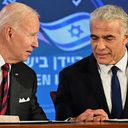U.S. toughened positions in Iran deal response, Israeli officials say

When Israeli national security adviser Eyal Hulata arrived in Washington this week, his government was highly concerned that the Biden administration was about to make new concessions to reach a nuclear deal with Iran. After the visit, that anxiety has been reduced, three Israeli officials say.
Why it matters: The U.S. and Iran have moved much closer to a deal to restore the 2015 nuclear accord in recent weeks, but a few key Iranian demands remain unresolved. According to the Israeli officials, the U.S. has toughened its positions on those demands.
- The Israeli government has consistently objected to the Biden administration's efforts to salvage the deal. Last week, Prime Minister Yair Lapid said that even continuing to negotiate would show "weakness."
- The White House says the reason a deal is now getting closer is that Iran has made significant concessions. But the Israeli side has been concerned the U.S. might soften its own positions to get the deal across the line.
Driving the news: Hulata met White House national security adviser Jake Sullivan and Middle East coordinator Brett McGurk on Tuesday and received a briefing on the U.S. response to Iran's positions, a day before they were formally conveyed to Iran in writing.
- Lapid said at a meeting of his political party on Wednesday in Tel Aviv that the U.S. had accepted many of Israel's requests in its response.
One of the biggest concerns for Israel has been that the U.S. would press the International Atomic Energy Agency (IAEA) to close its investigations into Iran’s undeclared nuclear activity, as Tehran has requested.
- The senior U.S. officials made clear to Hulata that the U.S. would not put political pressure on the agency, the Israeli officials say.
- National security council spokesman John Kirby said publicly the next day that the U.S. would not agree to make the nuclear deal conditional on the closure of the IAEA probe.
- “We have communicated to Iran, both in public and private, that it must answer the IAEA questions. It's the only way to address those concerns. And our position on that is not going to change," Kirby briefed reporters.
Another Israeli concern was the possible easing of restrictions on conducting business with Iranian companies linked to the Islamic Revolutionary Guards Corps (IRGC) after the deal.
- The White House assured Israel it would not soften its position on that due diligence process, according to the Israeli officials.
A third concern was over the economic guarantees Iran would receive to protect against a scenario in which a future U.S. president withdraws from the deal, as Trump did in 2018.
- The Iranians have demanded that international companies that sign contracts in Iran receive a 2.5-year grace period from renewed U.S. sanctions.
- According to the Israeli officials, the U.S. will only agree to such a grace period if Iran remains in the deal for those 2.5 years.
A White House National Security Council spokesperson said the administration has "taken a deliberate and principled approach to these negotiations from the start."
- "Gaps still remain, and we are continuing to negotiate," the spokesperson added.
State of play: After Hulata's trip, the Israeli officials say they are reassured that the U.S. does not plan to give Iran further meaningful concessions.
- They also saw the U.S. airstrike against Iran-backed militias in Syria on Tuesday as a sign that the U.S. is not rushing into a nuclear deal.
Yes, but: The Israeli officials think Israel's public pressure influenced the U.S. response to Iran's positions, and plan to keep up their engagement to try and prevent any U.S. concessions.
Editor's note: This story has been updated with additional details from the White House National Security Council.